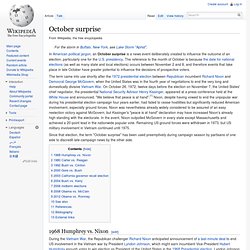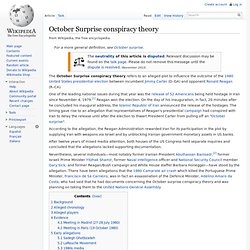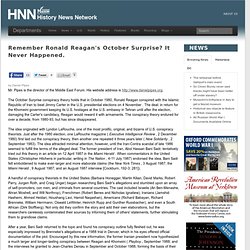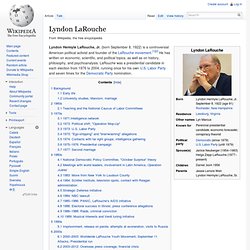

Secret Wars of the CIA John Stockwell. The CIA's Covert Operations: Afghanistan, Cambodia, Nicaragua, El Salvador. October surprise. Since that election, the term "October surprise" has been used preemptively during campaign season by partisans of one side to discredit late-campaign news by the other side. 1968 Humphrey vs.

Nixon[edit] During the Vietnam War, the Republican challenger Richard Nixon anticipated announcement of a last-minute deal to end US involvement in the Vietnam war by President Lyndon Johnson, which might earn incumbent Vice-President Hubert Humphrey enough votes to win election as President of the United States in the 1968 Presidential election. Lyndon Johnson tried to salvage the election for his vice president, Hubert Humphrey, with a false claim of a peace breakthrough in the Vietnam talks a few days before the election. LBJ announced an enhanced bombing halt and more intensive talks in which the Viet Cong and the Saigon government would be “free to participate”. 1980 Carter vs. 1992 Bush vs. 2000 Gore vs. 2003 California governor recall election[edit] 2004 Bush vs. 2006 midterm elections[edit]
October Surprise conspiracy theory. The October Surprise conspiracy theory refers to an alleged plot to influence the outcome of the 1980 United States presidential election between incumbent Jimmy Carter (D–GA) and opponent Ronald Reagan (R–CA).

One of the leading national issues during that year was the release of 52 Americans being held hostage in Iran since November 4, 1979.[1] Reagan won the election. On the day of his inauguration, in fact, 20 minutes after he concluded his inaugural address, the Islamic Republic of Iran announced the release of the hostages. The timing gave rise to an allegation that representatives of Reagan's presidential campaign had conspired with Iran to delay the release until after the election to thwart President Carter from pulling off an "October surprise".
According to the allegation, the Reagan Administration rewarded Iran for its participation in the plot by supplying Iran with weapons via Israel and by unblocking Iranian government monetary assets in US banks. Background[edit] Remember Ronald Reagan's October Surprise? It Never Happened. By Daniel Pipes Mr.

Pipes is the director of the Middle East Forum. His website address is The October Surprise conspiracy theory holds that in October 1980, Ronald Reagan conspired with the Islamic Republic of Iran to beat Jimmy Carter in the U.S. presidential elections on 4 November . The deal: in return for the Khomeini government keeping its U.S. hostages at the U.S. embassy in Tehran until after the election, damaging the Carter's candidacy, Reagan would reward it with armaments. The idea originated with Lyndon LaRouche, one of the most prolific, original, and bizarre of U.S. conspiracy theorists. A handful of conspiracy theorists in the United States (Barbara Honegger, Martin Kilian, David Marks, Robert Parry, Jurgen Roth, and Craig Unger) began researching Bani Sadr's allegations and stumbled upon an array of self-promoters, con men, and criminals from several countries. Lyndon LaRouche. Background[edit] Early life[edit] University studies, Marxism, marriage[edit] LaRouche attended Northeastern University in Boston and left in 1942.

He later wrote that his teachers "lacked the competence to teach me on conditions I was willing to tolerate".[8] As a Quaker, he was a conscientious objector (CO) during World War II, and joined a Civilian Public Service camp.[9] In 1944 he joined the United States Army as a non-combatant and served in India and Burma with medical units. October Surprise by Gary Sick. The "October Surprise" Theory. Published in Conspiracy Theories in American History: An Encyclopedia Santa Barbara, Calif.: ABC-Clio, 2003 Vol. 2, pp. 547-50 The October Surprise conspiracy theory holds that in October 1980, Ronald Reagan conspired with the Islamic Republic of Iran to beat Jimmy Carter in the U.S. presidential elections on 4 November.

The deal: in return for the Khomeini government keeping its U.S. hostages at the U.S. embassy in Tehran until after the election, damaging the Carter's candidacy, Reagan would reward it with armaments. The conspiracy theory endured for over a decade, 1980-93, but has since disappeared. The idea originated with Lyndon LaRouche, one of the most prolific, original, and bizarre of U.S. conspiracy theorists. Just after the 1980 election, one LaRouche magazine (Executive Intelligence Review, 2 December 1980) first laid out the conspiracy theory, then another one repeated it three years later (New Solidarity, 2 September 1983).
References. John Stockwell. Angola History.